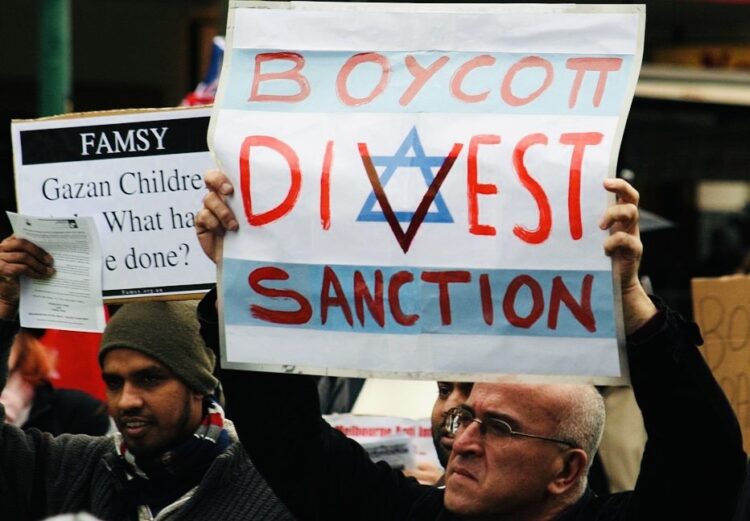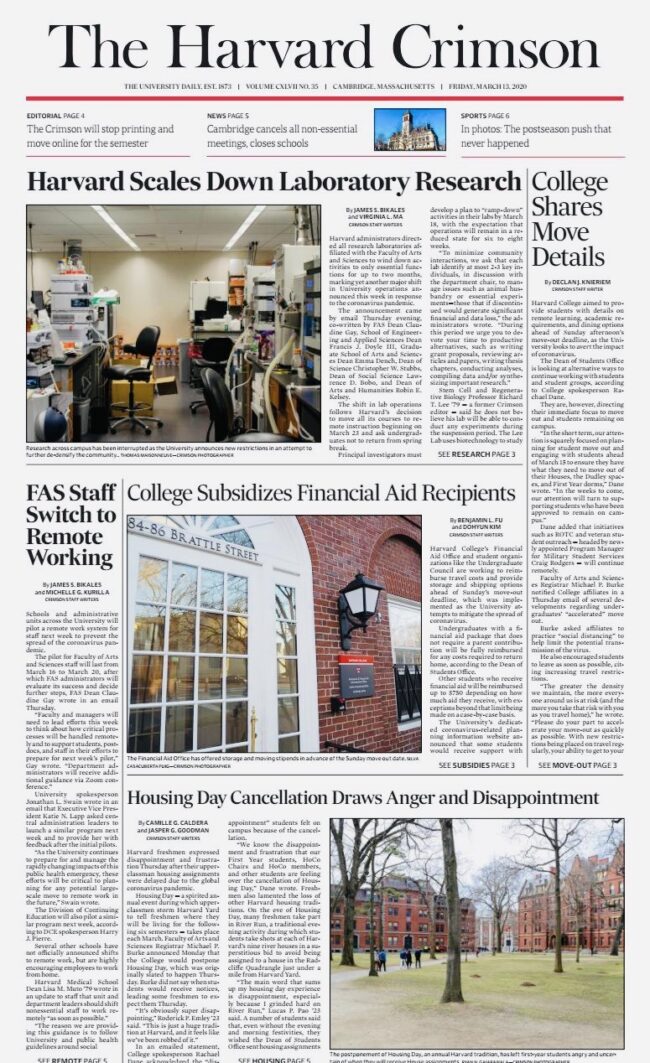Israel was dealt a stunning indirect blow on April 29 when the Harvard Crimson, the student newspaper at Harvard University, endorsed the Boycott, Divestment, Sanctions (BDS) movement.
Responding to pressure from the university’s Palestine Solidarity Committee, free speech rights groups and a campus visit from anti-Zionist activist Noam Chomsky, the editorial board of the oldest continuously published university daily in the United States regrettably came out in full-throated favor of BDS.
Pro-Palestinian advocacy has become a fairly common phenomenon on American campuses in the past decade. BDS resolutions were passed at 11 universities last year. These controversial resolutions speak to the “progressive” climate that prevails at many U.S. universities today.

As Israel tightens its grip on the West Bank and the Palestinian public relations campaign gains further traction, more and more university student newspapers and student counsels are likely to seriously consider such resolutions.
It is surely a disturbing sign of the times that the BDS movement has breached the ramparts of Harvard, one of the finest and most prestigious universities. If BDS can triumph at Harvard, a prime Ivy League institution, its chances of success on other campuses are doubtless enhanced.
BDS is on a roll because Israel is increasingly seen in the blackest of colors by a new generation of student activists. They regard Israel as an oppressive, colonial ethnostate that discriminates against its Arab citizens, suppresses Palestinian Arabs in the occupied West Bank, and adamantly forbids Palestinian refugees to return to their homes in what is now Israel.

The three pillars of BDS address these contentious issues. BDS calls for full equality between Israeli Jews and Israeli Arab Muslims and Christians, Israel’s complete withdrawal from the West Bank, and the “right of return” of Palestinian refugees who wish to resettle in Israel.
Until very recently, the Harvard Crimson expressed ambivalence about BDS. “In the past, our board was skeptical of the movement (if not, generally speaking, of its goals), arguing that BDS as a whole did not ‘get at the nuances and particularities of the Israel-Palestine conflict,'” the newspaper’s editorial board opined. “We regret and reject that view.”
Previously, the editorial board rejected the comparison between Israel and apartheid South Africa, branding it as both “repugnant” and “offensive.”
But having observed Israeli “property and land confiscations, citizenship denials, movement restrictions and unlawful killings that victimize Palestinians day in and day out” in what the editorial board described as “occupied Palestine,” it decided to take a stand. “Palestinians, in our board’s view, deserve dignity and freedom. We support the (BDS) movement as a means to achieving that goal.”

Having jumped abroad the BDS bandwagon, the editorial board noted that BDS “helped win the liberation of Black South Africans from apartheid, and (has) the potential to do the same for Palestinians today.”
The editorial board added that current Israeli policy “pushes Palestinians toward indefinite statelessness” and promotes the construction and expansion of “illegal settlements,” which block the prospect of a two-state solution.
“We do not take this decision lightly,” the editorial board said. “BDS remains a blunt approach … But the weight of this moment — of Israel’s human rights and international law violations and of Palestine’s cry for freedom — demands this step.”
Support for “Palestinian liberation” is “not antisemitic,” the editorial board claimed. “We unambiguously oppose and condemn antisemitism in every and all forms … Jewish people — like every people, including Palestinians — deserve nothing but life, peace and security.”
For Israel and supporters of Jewish statehood, Harvard Crimson‘s endorsement of BDS is a potentially dangerous development. It means that a growing proportion of America’s future elite has soured on Israel and joined the Palestinian camp. Disillusionment with Israel in American liberal circles is already apparent in left-of-center corners of the Democratic Party.
To an alarming extent, responsibility for this situation rests with Israel itself. Since the Six Day War, Israel has built a web of settlements in the West Bank whose existence precludes the possibility of a geographically contiguous and viable Palestinian state.
Israel’s current prime minister, Naftali Bennett, is a firm supporter of the settlement movement and a staunch adversary of Palestinian statehood. His predecessor, Benjamin Netanyahu, held virtually identical views.
Lest outsiders be misled, BDS leaders are not necessarily committed to a two-state solution. A substantial number of BDSers advocate a one-state solution, which would definitely spell finis to Israel’s status as a Jewish state.

It should be crystal clear that BDS’ advocacy of the right-of-return is an unambiguous indicator of its final position on Israel’s conflict with the Palestinians. If you cut through its high-minded rhetoric, you’re left with a binational state, a replacement for Israel as a sovereign, independent Jewish state.
The Jewish people, particularly after the Holocaust, are fully entitled to statehood in their ancestral homeland. It is true that Israel needs to alter its short-sighted and counter-productive policies toward the Palestinians. Yet it is equally true that Israel’s geopolitical flaws are not legitimate reasons for its elimination and removal from the body of nations. This would be morally and politically wrong and unjustifiable, a travesty of justice.
It should be clear that the rejection of Jewish statehood, a core component of BDS philosophy, is a kind of antisemitism. So when the Harvard Crimson editorial board deliberately threw its weight behind BDS, it was tacitly complicit in calling for Israel’s elimination as a Jewish state.
Palestinians whose ancestors left Palestine under duress in 1948 have a far better moral claim than the Harvard Crimson to support BDS. But it should be borne in mind that the right of return, if carried out, is precisely a prescription for Israel’s piecemeal destruction.
The Harvard Crimson editorial board was surely aware of this when it cast its lot with BDS.
